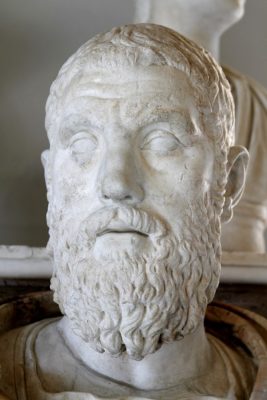| Macrinus | |
|---|---|
 |
|
| Roman Emperor | |
| In Power | Apr 11, 217 – Jun 8, 218 |
| Born | c. 165 Caesarea, Mauretania Caesariensis |
| Died | Jun 218 (aged 53) |
| Wife | Nonia Celsa |
Marcus Opellius Macrinus was born in 164 in Mauretania, in present-day Algeria. He came from a wealthy family and enjoyed a good education. It is believed that as a young man, he journeyed to Rome and became a skilled lawyer during the time of Severus. He entered the arena of politics and became a prominent figure. He eventually secured high standing during the reign of Caracalla, who appointed him as Praetorian Prefect. This role made him Caracalla’s second-in-command in the war against the Parthians
However, Caracalla soon began mocking Macrinus’ lack of military knowledge. When Caracalla heard of a prophecy that Macrinus would kill him, he began plotting against his Praetorian Prefect. Macrinus had heard of the prophecy too and recruited a soldier named Martialis. Martialis did not need much persuasion, as his desire to be a centurion had been rejected by Caracalla earlier on. Martialis had his chance soon after and stabbed the emperor to death while he was urinating on the side of a road in Carrhae. Macrinus declared himself as an emperor without resistance from the soldiers, who probably thought Martialis acted on his own. The new emperor quickly declared his son, Diadumenianus, as Caesar.
Reign
To gain the approval of those who supported the Severan dynasty, Macrinus assumed the name Severus. The Senate did not like him, though, not only because of the means he used to take the throne but also because he was not from the patrician class. Macrinus’ public image deteriorated further when he removed provincial governors and replaced them with people who shared his unprivileged class.
Macrinus inherited grave financial problems from Caracalla’s reign caused by the large pay granted to soldiers and the funds used in previous wars. To add to this, the Parthians continued to rebel along the eastern limits of the empire. Instead of resuming Caracalla’s war, Macrinus offered to pay the Parthians a large amount of money as a peace settlement. This made him even more unpopular with the public. Armenia, at the same time, was also rising up against Rome because Caracalla had imprisoned Khosrov I. Worried about the state’s drained finances, Macrinus once again chose to seek peace, returned the prisoner, and signed a peace treaty.
The new emperor was determined to solve the state’s financial woes. First, he increased the silver content of the denarius back to its value in Severus’ time. Next, he turned his attention to the large amounts of money being pumped into soldiers’ pay. He knew he could not simply reduce the soldiers’ pay because they might rebel against him. Instead, Macrinus reduced the salaries of newly-enlisted soldiers. This brought much displeasure to the military, including veteran soldiers who felt their salaries would be reduced too.
Death
Macrinus soon heard that Julia Domna, Caracalla’s mother, was plotting to assassinate him and avenge her son. He issued an order to arrest her, but she died of an illness. Meanwhile, Domna’s sister, Julia Maesa, sparked rumors that her son, Elagabalus, was Caracalla’s illegitimate child, and was therefore chosen by the gods to rule. Soon after this rumor spread, the Legio III Gallica declared Elagabalus as emperor.
Macrinus rushed to Antioch, where he started devising a plan to stop the rebellion. Sensing great danger, he proclaimed his son as co-emperor. Elagabalus’ army eventually marched into Antioch and crushed Macrinus’ forces. Macrinus tried to escape to Rome but was caught in Chalcedon. Hearing that his son had been killed, he tried to escape but failed. He was later taken to Cappadocia and executed.
Elagabalus assumed the throne and ordered a damnatio memoriae against Macrinus and his son. Coins portraying their faces were destroyed and Macrinus’ marble statues were shattered.